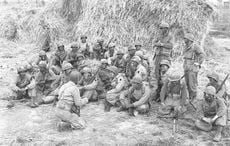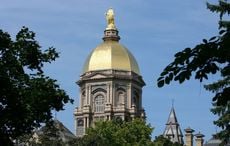Trinity College Dublin has recently acquired an extensive collection of letters written by Samuel Beckett to a French couple he met while evading Nazis. The university’s library now holds the world's largest collection of the playwright’s letters.
The 347 letters and postcards were sent to Henri and Josette Hayden, French artists whom Beckett and his wife, Suzanne Dechevaux-Dumesnil, met while both couples were in southern France hiding from the Nazis during World War II. The letters were written after the war, between 1947 and 1958, a difficult period in Beckett’s life, during which his mother and his brother Frank died. The time span also corresponds with Beckett’s completion of his most famous work ‘Waiting for Godot’ and work on his trilogy "Molloy," "Malone Dies" and "The Unnameable."
In August 1950, Beckett wrote to the Haydens about his mother dying, comparing it to the sound of a night train near his country home in Ussy, northern France.
"My mother is still declining," Beckett wrote.
"It's like one of those decrescendos made by the trains at Ussy which I used to listen to at night, interminable, suddenly resuming just when everything seemed finished and the silence final.
"I think she will die in hospital in a week or so."
The Leinster Express reports that the letters were bough at an auction in London for €180,000 earlier this year.
Dublin-born Beckett was a student at Trinity College and a generous benefactor to the college: he presented some of his own literary manuscripts to the library in the 1960s, donated some of his Nobel prize money to the library; and gave a year’s worth of royalties from the Broadway production of "Krapp’s Last Tape" to the Berkeley Library’s building fund in the 1950s.
Trinity was able to acquire the collection of Beckett’s letters tanks to the bequest of former staff member William O’Sullivan, Keeper of Manuscripts in Trinity from the 1950s to 1982.
“These Beckett letters are very significant for Beckett scholarship at Trinity College, as well as nationally and internationally. We have been developing collections of significant Irish creative writers, and these letters build on the existing Beckett collections the Library already holds,” said Librarian and College Archivist Helen Shenton, according to a press release from the university.
“We welcome the opportunity to be able to share these collections with students of Beckett and researchers across the globe. To mark its arrival, we have mounted a small exhibition in the Long Room for those who would like to view this precious correspondence. We intend to make it more widely accessible for scholars and for the general public in the future.”
An exhibition of the collection is being held in the library’s Long Room.




Comments